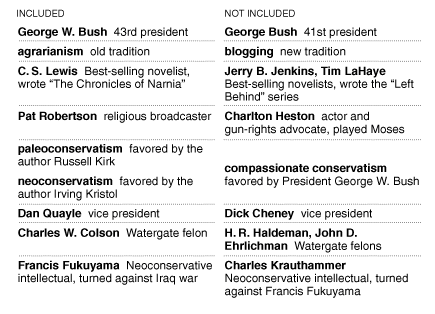One of the most interesting things about new media is the light that it shines on how old media works and doesn’t work, a phenomenon that Marshall McLuhan encapsulated precisely with his declaration that a fish doesn’t realize that it lives in water until it finds itself stranded on land. The latest demonstration: an article on the front page of yesterday’s New York Times. (The version in the International Herald Tribune might be more rot-resistant, though it lacks illustrations.) The Times details, with no small amount of snark, how the conservatives have taken it upon themselves to construct an Encyclopedia of American Conservatism.
We’ve spent a disproportionate amount of time discussing encyclopedias on this blog. What’s interesting to me about this one is how resolutely old-fashioned it is: it’s print-based through and through. The editors have decided who’s in and who’s out, as the Times points out in this useful chart:

Readers are not allowed to argue with the selections: American Conservatism is what the editors say it is. It’s a closed text and not up for discussion. Readers can discuss it, of course – that’s what I’m doing here – but such discussions have no direct impact on the text itself.
There’s a political moral to be teased out here – conservative thinking is dogmatic rather than dialectical – but that’s too easy. I’m more interested in how we think about this. Would we notice the authoritarian nature of this work if we didn’t have things like the Wikipedia to compare it to? Someone who knows more about book history than I can confirm whether Diderot & d’Alembert had to deal with readers disgruntled by omissions from their Encyclopédie. It’s only now, however, that we sense the loss of potential: compared to the Wikipedia this seems limiting.
